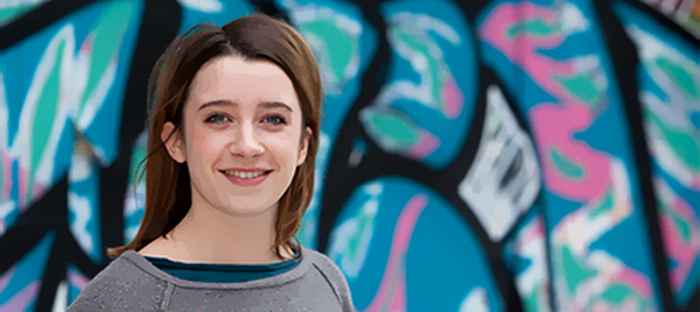Georgia Walker

Educational background
I have a Bachelor’s in English Literature from the University of Bristol in the United Kingdom. During the second year of my Bachelor’s degree I also did an exchange programme in Slovenia.
Why Comparative Cultural Analysis?
I really wanted to do a Master’s degree in another country, but also wished it to be an English-taught programme. After a thorough search I eventually decided to do the Master’s programme Comparative Cultural Analysis at the University of Amsterdam. Not only had I heard many good things about the programme (and the University), but the tuition fees were also much lower than in the U.K.
Another reason why I chose this Master’s was because of its interdisciplinary character. As part of the programme we are introduced to diverse academic disciplines, such as psychology, film, sociology, philosophy, etc. We also use different and wide-ranging objects of analysis, including, inter alia, films, political documents, literature and so forth.
Has the programme met your expectations?
Most definitely. Although I have to admit that I initially didn’t really know what to expect. Considering my academic background, it was a big leap to take from English literature to cultural analysis. My initial trepidation notwithstanding, the programme has far exceeded my expectations, and is very engrossing. Since I started with the programme in August of 2012, I’ve learned so much about things I never knew anything about, such as cultural and philosophical theory, as well as other topics which I never even thought could be studied. It’s turned out to be a real academic adventure.
Two more concrete aspects of the programme which I have come to appreciate are the small classes and the accessibility of the academic staff. Starting with the classes, I was struck by how well the small groups (averaging about ten people per class) engender a lively, stimulating and interactive academic environment. The classes are characterised by constant debate between all participants, including the lecturers. Everyone is encouraged to contribute their own opinions and ideas, and take an active part in the proceedings. By listening to everyone and exchanging opinions and viewpoints, one is constantly learning and expanding one’s own academic horizon. As for the lecturers, I am amazed about how informal the lines of communication are. The lecturers involved in our programme are like colleagues, and are always interested in hearing our opinions and listening to our viewpoints. The informal environment at the UvA has really given me faith in my own academic capabilities and motivates me to perform to the best of my abilities.
Any other projects / extracurricular activities?
Aside from the programme, which is really demanding, I also work part-time about 15 to 20 hours per week. Although it can be quite taxing at times, I am nonetheless really glad that I took up employment, as it has helped me make friends with the locals and learn more about Amsterdam and Dutch culture than I ever would have done as a mere student. I really feel much more embedded in Dutch society since finding work here.
What do you think about the UvA / Amsterdam?
I absolutely love Amsterdam. The quality of life is here is much better than in U.K. The fact that you can get around just about everywhere on your bike not only makes you more mobile, but also does wonders for your overall physical and mental health. The city itself is absolutely beautiful and exudes dynamism and cultural vibrancy. If I had to think of one negative aspect of Amsterdam, it would be the lack of affordable housing, which can be a real nightmare for someone looking for a place to stay.
As for the UvA, well, I couldn’t have made a better choice. The quality of the lecturers, the general academic environment, the people, it’s just a great institution.
Plans after graduating?
At the moment I’m considering applying for the Research Master’s programme Cultural Analysis, as I would possibly like to pursue a PhD. However, I’m still oscillating between a career inside or outside the academia, and would also like to do an internship at a cultural organisation, such as the British Council. Only time will tell, I guess.
Tips for new students?
Work hard and make sure you find a place to stay before coming to the Netherlands. As for the programme, I would advise new students to get involved from day one and participate in each and every facet of student life. Also be prepared to speak out and actively contribute in class. If you remember to do these things, you’ll have a truly memorable and formative experience.